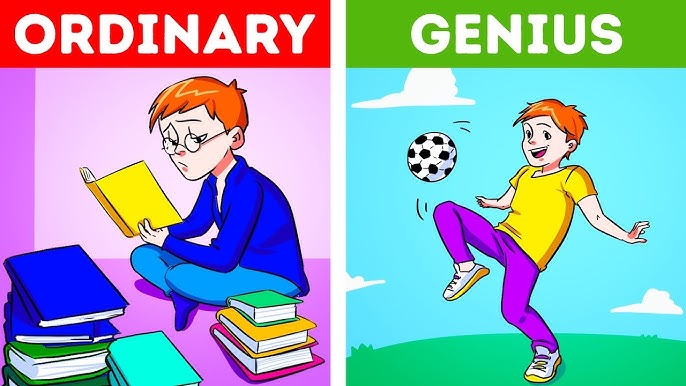“Success and average don’t have nothing to do with each other.”
- Eric Thomas, American motivational speaker
Let’s take the legendary Steve Jobs and Bill Gates as examples. They both were college dropouts, but they dared to dream big. They believed what they dreamt and fought for it until Apple and Microsoft came to be acclaimed as global entities.
Peter Carrey, an associate academic writer at MyAssignmenthelp and ex-professor of Economics at a reputable institute in Chicago, says, “The process of learning need not be confined to the walls of a classroom. After all, there are hardly any academic textbooksthat will teach you how to live and pay your bills. Real-life experiences and failures do it faster and better.”
Now, the question is, why is it so that most C graders end up being so successful while the A graders end up working for them? Let’s connect the dots with these following four reasons explaining the math behind it.
Happy reading!
- It’s not always about “studying” for the C graders
Many A graders often end up with knowledge that isn’t sufficient for them to be street smart. Whereas, the last benchers or the average performing students are said to develop smarter skills at an early age. And that’s where the difference lies.
Yes, the average students do study, take classroom notes, and also miss out on them. But then they quickly find a way out to accumulate the lost notes successfully. Frivolous studying is not the only thing the C graders do. Most of them hate doing homework.
Now, there are two different impacts of not doing homework on time. Firstly, you invite trouble, only to sit back and dread the consequence of not turning up with the assignment on time.
Secondly, since you dread the outcome, you would immediately start figuring out an alternative way to get it done. And that’s what matters. Once you are exposed to challenges and risks, you learn things the hard way.This helps you develop quick managerial skills.

- The C graders pursue other interests as well
Why do you think an average student is called an average student? I don’t know whether the society is to be blamed, but it’s a norm to call a student average if he/she fails to achieve A grades. Even if they take an interest in other creative activities, it often goes unnoticed during their academic days.
On the other hand, it has been seen that most A graders are only focused on learning on what their teachers ask them to learn. Even though the practice helps them to be in the good books of their teachers, it is somewhat not effective for them when it comes to making life decisions.
They have always done what has been asked or prompted by their teachers and parents. As a result, they never really tried breaking the walls and think out of the box. Whereas, a C grader would learn enough about the subject to obtain a decent pass mark, hone the required skill and also tread beyond it to pursue other interests. Now, you decide, who is in the profitable end?
- C graders are more chilled out and creative
C for Chill, C for Cool and of course C for Creativity. C graders don’t always need to be at the top or feel pressurized on the grounds of scoring 99 out of 100. Since they never set such unrealistic expectations for themselves, they got a lot more to do other than scoring A+. This is where creativity comes in. All those doodles and random scribbling on the last page of the textbookhave always been the forte of average students. They can always think beyond the regular and give their brains enough space to breathe happily.
As a matter of fact, Russell Simmons, the City College (New York) dropout reconsidered his career and founded the Def Jam Recordings that marked the beginning of his hip-hop music empire. Give me one name of an A grader who dared to root for his/her creative inclinations instead of abiding by the conventional methods of learning and education.
- The C graders are mostly entrepreneurial
Anyone who seeks opportunity even under situations that lack possibilities and scopes is truly entrepreneurial. C graders are often found to develop such traits at an early age. I can relate to this from my personal experience. Being an out and out Joker fan, I took one of his quotes, “If you are good at something, never do it for free”, quite seriously during my college days. I used to play college gigs back then as I had a flair for bass guitars and microphones.
After a couple of concertsgot exposure and people start recognizing me as the bassist of our college band, I thought I must do something out of it. I decided to monetize my effort. So, I started delivering lessons on how to play the bass guitar on YouTube.
Not only did the channel pay me for the content and number of subscribers and views, but I also made my presence felt among many aspirants. This, eventually lead to me establishing a practice pad for young guitarists to attend my classes, learn and jam with me.
I was earning good bucks, good enough to support my personal expenses back then. My compositions were appreciated across all major music review sites. It was an incredibly special feeling I must admit!
Parting Thoughts,
No matter if you have been an A grader or a C grader in your class, what matters is how you fought back to get things back on track in life.
Profession and passion are two different things. Life gives us the chance to work on both of them. And when life happens, believe me – you don’t get to use the classroom eraser to wipe off your mistakes. You got to work harder, learn from the mistakes and never repeat the same in the long run. “An student who never committed an error had a go at nothing new”- Keira, Essaycritics
So, take note of the points as mentioned above, focus on the key takeaways and win over every challenge the way you used to do back then, sitting in the last bench of your classroom, yet ahead of many.
Good luck, pal!
Also read: Myths about Online Education

